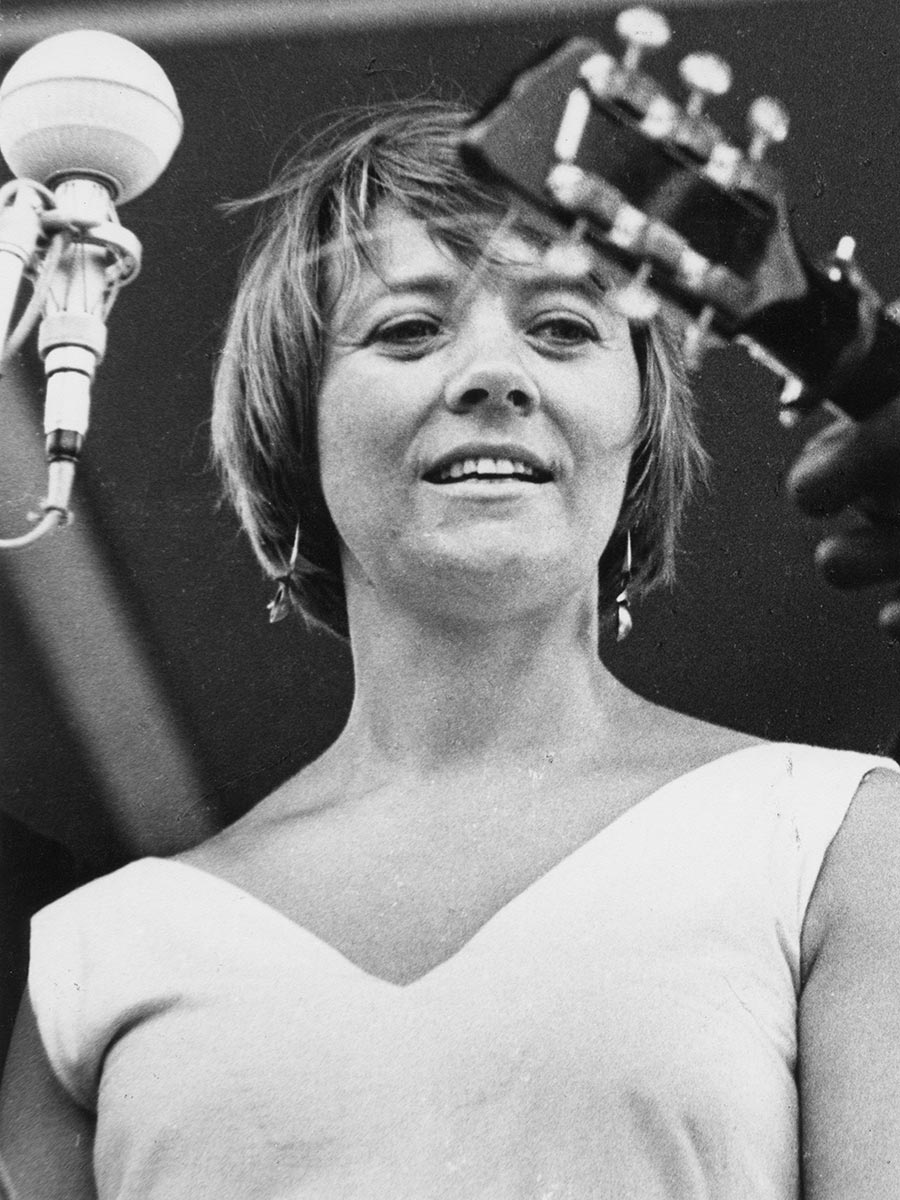-

Remembering Barbara Dane, 1927-2024
We at Smithsonian Folkways are deeply saddened by the passing of our very longtime friend and collaborator Barbara Dane. Barbara started recording for Folkways in 1964. It was a label which released the songs of artist-activists like Woody Guthrie, Pete Seeger, Aunt Molly Jackson, and Earl Robinson. Songs that were written to make a difference. That’s always what Barbara was about.
She performed jazz, blues, and folk music, but she didn’t want to be reduced to those genres. She said she was a people’s singer.
Barbara Dane grew up in Detroit, Michigan, and got involved in left-wing politics from a young age. She started by singing jazz alongside Louis Armstrong, Memphis Slim, and others. Jazz critic Leonard Feather called her “Bessie Smith in stereo.” She performed often with Black musicians during the era of segregation, including singing civil rights songs with The Chambers Brothers. She also experienced and fought back against sexism in the music business. Even when she was a teenager trying out for small singing parts, she refused the leering requests of men in charge. Barbara always stated her opinion.
Barbara opened a jazz and blues club in San Francisco called Sugar Hill: Home of the Blues, which featured performers like Big Mama Thornton, Lightnin’ Hopkins, Tampa Red, Brownie McGhee and Sonny Terry, and a number of jazz musicians. She insisted on running the club herself.
Barbara used her songwriting for political activism, writing songs about the environment, civil rights, and against the Vietnam War. Her music was distributed among political circles. With her husband, Irwin Silber, Barbara traveled to post-revolution Cuba—even though the State Department forbade it. They weren’t gonna stop her.
Irwin was the editor of Sing Out! Magazine, which published topical and political songs. He also worked in the Folkways office. Barbara was part of that world. They were both Marxists from the start, but the content in the magazine changed as they both embraced radical social movements. During that time, Barbara and Irwin started their own label, Paredon, perhaps to have more control over their output. They released fifty albums. Smithsonian Folkways acquired Paredon in 1991.
That year, over the course of two days, I was able to do an extensive interview with Barbara and Irwin. Also in that era, she put out two releases for her friend Chris Strachwitz—founder of Arhoolie Records—which are also in the Smithsonian collection. Barbara kept playing jazz in San Francisco until her death and released recordings with some of her collaborators. In 2017, to celebrate her 90th birthday, I worked with Barbara, her daughter Nina Menéndez, and audio engineer Jessica Thompson to create a retrospective, Hot Jazz, Cool Blues & Hard-Hitting Songs. The collection featured tracks from her various albums as well as some recordings from old tapes she’d turned up in her basement: performances with Doc Watson, Pete Seeger, Art Hodes, and others. It was a chance to look back at her career.
Luckily, Barbara’s friends and collaborators extensively documented her important life while she was still here. One standout is The 9 Lives of Barbara Dane, directed and co-produced by her friend Maureen Gosling. A video oral history was done by James Early and Dan Sheehy. She published an autobiography, This Bell Still Rings: My Life of Defiance and Song. We are fortunate to have her words and memories.
Written by Jeff Place
Jeff Place has been at the Center for Folklife and Cultural Heritage’s Ralph Rinzler Folklife Archives and Collections since 1988. He holds an MLS from the University of Maryland and specializes in sound archives. He oversees the cataloging of the Center's collections and has been involved in the compilation of over sixty CDs of American music for Smithsonian Folkways Recordings including the Lead Belly Legacy Series; the Pete Seeger American Favorite Ballads; Jazz Fest; and The Asch Recordings (Woody Guthrie). Place has been nominated for ten GRAMMY Awards and twelve Indie Awards, winning three GRAMMYs and six Indies. He was one of the producers and writers of the acclaimed 1997 edition of the Anthology of American Folk Music and The Best of Broadside, 1962-1988 (2000). He has served on the curatorial team for a number of exhibitions including the traveling Woody Guthrie exhibition This Land is Your Land. In 2003, he co-curated the Smithsonian Folklife Festival program on Appalachian culture. In 2012, he produced and co-authored (with Robert Santelli) the publication and CD-box set Woody at 100, Lead Belly: The Smithsonian Collection in 2014, and the Pete Seeger Centennial Collection in 2019.Remembering Barbara Dane, 1927-2024 | Smithsonian Folkways Recordings

